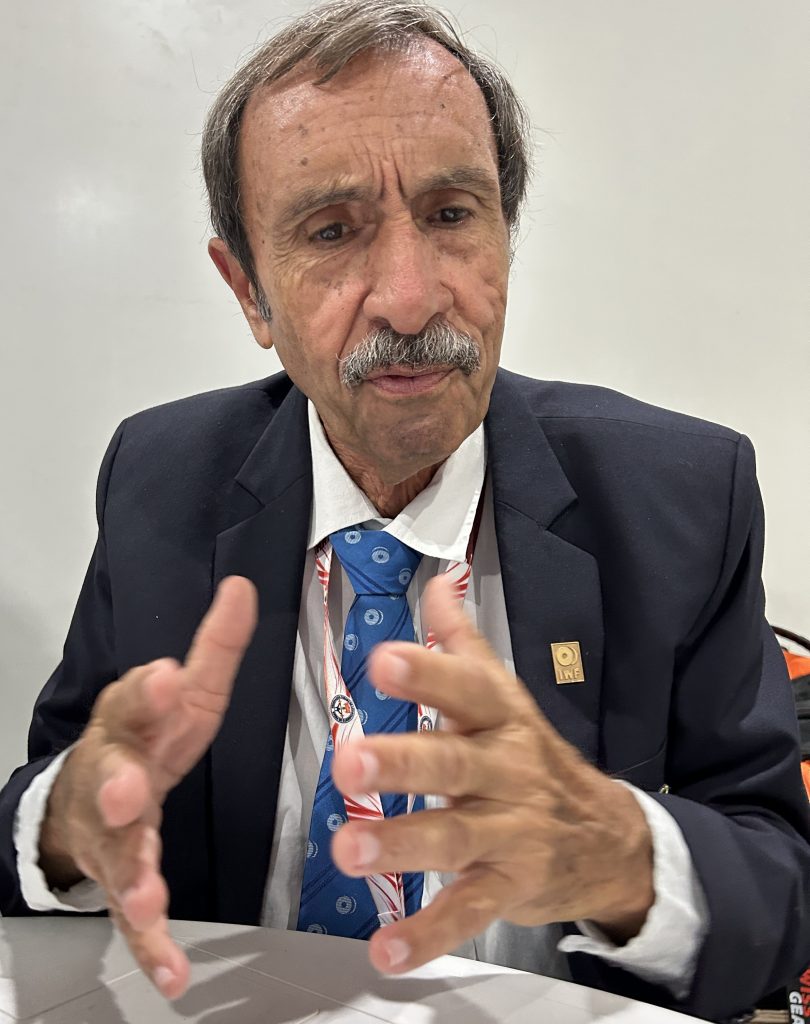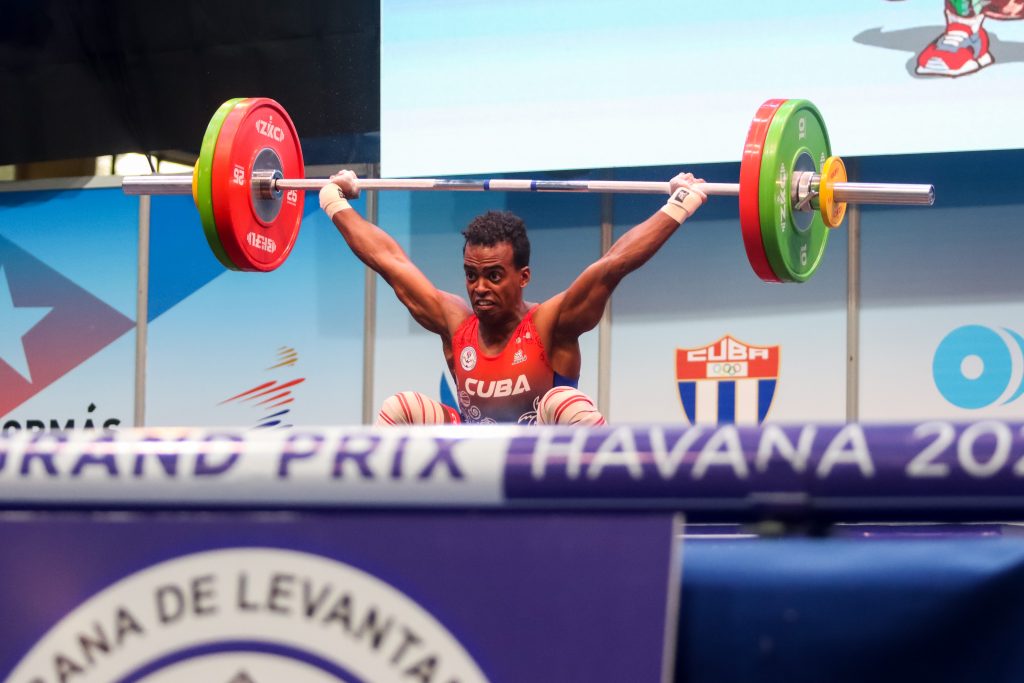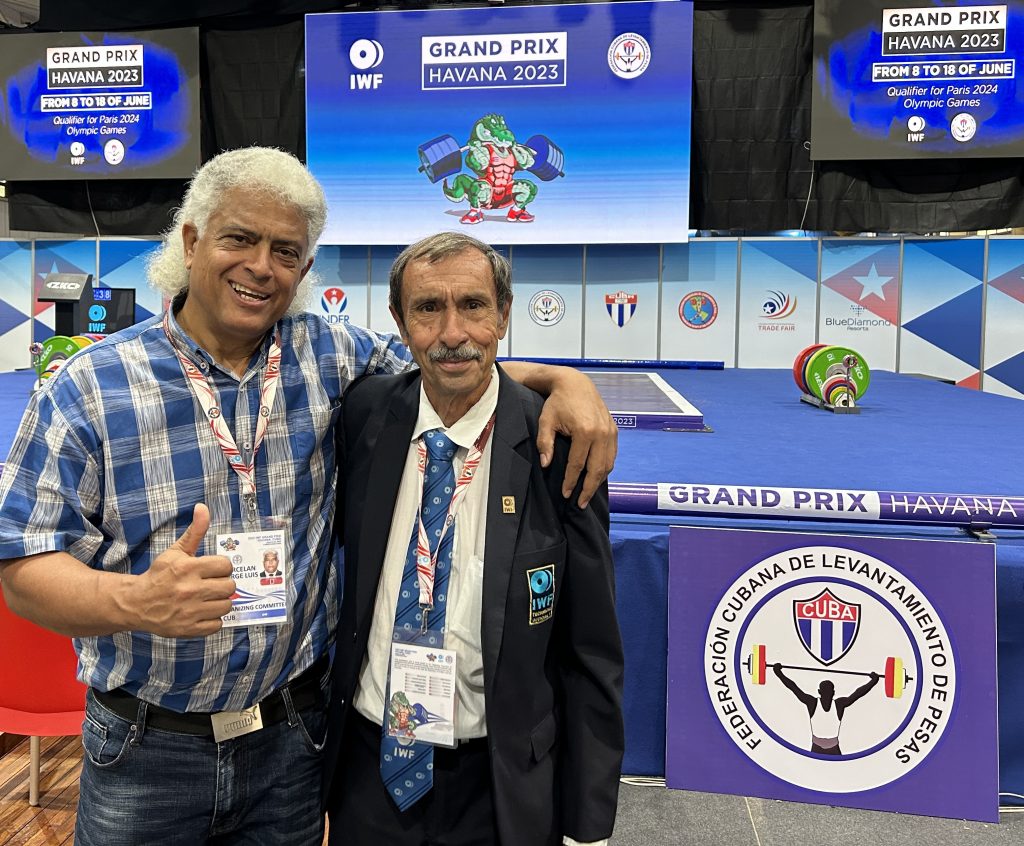From 1973 to 2023: The Professor’s memories
“Today, we have the conflict in Ukraine, but in 1973 we had also a difficult context. There was the Yom Kippur war and there was the ‘coup’ in Chile. The Israeli team arrived in Cuba and then withdrew, while the Chilean delegation could never land in Havana…” Discreet, in his dark blue suit, Carlos Cuervo is seated at the Pabexpo venue, the one hosting the IWF Grand Prix in the Cuban capital, waiting for the A session of the day, where he is one of the appointed Technical Officials. At almost 76, he is one of the most respected persons in the sport he “married” at the age of 14. Already present at the 1973 IWF World Championships, the last major event Cuba hosted in weightlifting, Cuervo is happy to share his memories and reflect on the present and future of his beloved sport.
“I was essentially helping the organisation back then in 1973, making sure everything would run smoothly. I was everywhere, running all the time, helping whoever needed assistance. It was a great competition, well attended and with many funny episodes. We were in a kind of circular arena and of course there wasn’t electronic scoreboards like today. There was however a huge metallic structure, with some people hiding behind curtains, changing by hand the name of the athletes and the respective weights they were lifting. The result was quite nice, but the people watching it could not imagine the hidden ‘human resources’ behind those constant and fast updates,” he recalls.
 Carlos Cuervo (CUB)
Carlos Cuervo (CUB)
The staging of an IWF World Championships followed the successful creation of a national team in 1965. “Before that, athletes were training in their corner, in their small town… There was no national coordination. A Cuban expert that had been in the Soviet Union then had the idea of creating a centralised group in Santa Clara. And this was decisive for the future. Results started to appear, namely at the 1967 Pan-American Games in Winnipeg, Canada, and the basis of what is today the Cuban weightlifting was initiated in those years,” Mr Cuervo admits.
A dynamic of success was in place and it was then not difficult to convince the international instance that the Cuban capital was able to host the IWF showcase. “At the time, the Secretary General of the International Federation was a British gentleman, Mr Oscar State, a very nice man, but a bit conservative. And to our surprise, at the end of the Championships, he said that those were the best he had been to. That was the best tribute we could receive”.
A consequence of the thorough development of Cuban weightlifting, the IWF World Championships (189 athletes – only men at the time – from 39 nations) were also a cause for further progress. “It was a big thing for our country. It fundamentally attracted many young people to weightlifting. Our national sport is baseball and to a less extent soccer or basketball. These are the main attractions for our youth. It is still the case today. But after that 1973 achievement, we managed to have many kids practicing the sport,” states the professor at the University of Physical Culture and Sport Sciences (UCCFD) in Havana.

Some years later, Olympic medals appeared. It all started in Moscow 1980, then again in 1992, and the last one in London 2012. In total, eight podium presences in the biggest sport event on the planet, including two gold, one silver, and five bronze linings. “Weightlifting became a strong sport in our country, but let’s be honest, it will never compete with baseball, or even basketball…” The reason is simple: “We need equipment in weightlifting. And if we want to be professional, that equipment is expensive. Everyone knows the economic problems we are facing, so it is difficult to equip with decent barbells all the national clubs or structures interested in developing weightlifting”.
There is even a more essential challenge – the nutritional aspect of the sport. “Competing at high-level, a lifter needs a very proteinic diet. This is unfortunately not easy to get in our country,” Mr Cuervo admits. “However, we, the Cubans, are experts in doing a lot with very few resources. We have a good generation of lifters, capable of achieving nice results. It’s maybe harder for us than for others, but we are getting there,” he confesses.
 Carlos Cuervo (right), with the President of Cuban Weightlifting Federation, Jorge Luis Barcelan
Carlos Cuervo (right), with the President of Cuban Weightlifting Federation, Jorge Luis Barcelan
After sharing these memories, Carlos Cuervo is happy to pose for a picture with the President of the Cuban Weightlifting Federation. “The Professor” – says Jorge Luis Barcelan, with a smile. “We owe him a lot in Cuba!”
By Pedro Adrega, IWF Communications










